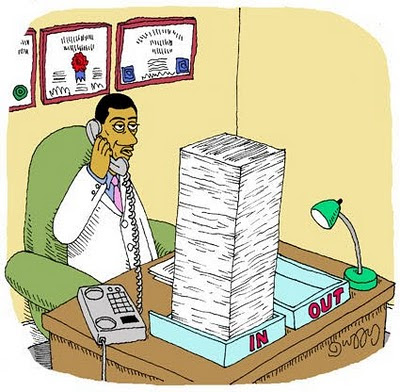March 7th, 2011 by DrRich in Health Policy, Opinion
1 Comment »

In his last post, DrRich analyzed whether the young Wisconsin doctors who stood out on street corners proudly offering fake “sick excuses” to protesting teachers were engaging in an act of civil disobedience. DrRich respectfully kept an open mind on this question, but after careful deliberation concluded that it is very unlikely that their actions constituted classic civil disobedience as espoused by Thoreau or Gandhi.
Instead, these doctors were, in a professional capacity, lying. They did not lie in any truly malicious way, however. They lied because they have been trained to believe in a higher cause than mere professional ethics, namely, the cause of social justice. They lied in full confidence that telling lies to advance such a noble cause is a natural duty of the medical profession. They never expected to be criticized for it (except perhaps by Rush Limbaugh and sundry teabaggers and the like), and they almost certainly will be stunned into indignant incoherence if they end up actually receiving the full punishments their actions allow.
But what really interests DrRich is the near-perfect silence we have seen from the mainstream news media regarding this sad episode. While it’s easy to find stories about the phony sick excuses all over Fox News and conservative websites, major outlets like the New York Times, Washington Post, CNN, CBS and NBC — sources one might expect to express at least some sympathy for these doctors and their work to advance a just cause – have reported next to nothing about it. When a left-leaning mainstream outlet does report on the episode (for instance, this article appearing in the Atlantic), rather than expressing any support for the Wisconsin doctors, they express at least mild dismay. It seems plain to DrRich that the mainstream media wish the whole thing hadn’t happened, and that perhaps their silence might help it go away as soon as possible.
So here we’ve got a small cadre of youthful and idealistic physicians, behaving in a manner entirely consistent with what they’ve just learned during their medical training, and not only are they facing formal investigations and potential punishment, but also the very people and organizations whom they were surely counting on for support have retreated into an embarrassed silence, or worse, criticism. What gives? Read more »
*This blog post was originally published at The Covert Rationing Blog*
January 22nd, 2011 by Bryan Vartabedian, M.D. in Health Policy, True Stories
1 Comment »

So I’m in the exam room recently with a new patient. After some initial dialog with the child and family, I launched into the business of problem solving. Ten minutes into my history the mother politely asks: “I’m sorry, and you are?…”
I hadn’t introduced myself. I had left my ID badge at my workstation, and by order of some innocent distraction with the child or family, I hadn’t identified myself immediately on entering the room. This is rare.
Sometimes I assume people will know who I am. But I don’t wear a white coat and my stethoscope is concealed. I wear clothes only good enough to sustain the barrage of regurgitation, urine, full-frontal coughs, and sloppy hugs that mark a successful clinic day. A colleague once told me I dress like an algebra teacher. I haven’t quite processed that one, but suffice it to say it’s easy to fall into a mistaken identity.
So I apologized and made a proper introduction. What’s remarkable is how far I went without the mother having any idea about my identity. I can imagine that it took a certain amount of wherewithal to interrupt the person she suspected was the doctor to ask such a basic question. Read more »
*This blog post was originally published at 33 Charts*
January 7th, 2011 by Bryan Vartabedian, M.D. in Better Health Network, Humor, Opinion, True Stories
No Comments »

 In the movie “The Sixth Sense,” there was that kid who saw dead people. I’m like that. But I see patients and their parents instead. They’re all around me.
In the movie “The Sixth Sense,” there was that kid who saw dead people. I’m like that. But I see patients and their parents instead. They’re all around me.
They’re watching at the grocery store when my kids act up. We meet during anniversary dinners, at Christmas Eve service, and on the treadmill at the Y. I bump into parents when buying personal effects and even during the early morning coffee run in my oldest sweats. I see patients.
The follow-up dialog between the parents might go something like this:
Dad: “Marge, don’t you think Billy’s colitis might be better managed by a doctor capable of pulling himself together?”
Mom: “Don’t be ridiculous, Frank. DrV’s bedhead has nothing to do with his ability to care for Billy. And besides, I’ve heard that he can intubate the terminal ileum in under 10 minutes.”
It’s not that I necessarily mind being seen in the wild. I’m pretty comfortable in my own skin, even when it’s glistening after a workout. I’m bothered more by the fact that patients may be repulsed by my occasional bedraggled appearance. If I knew they were good with it, I might be less caught up with the whole matter. Read more »
*This blog post was originally published at 33 Charts*
January 7th, 2011 by Happy Hospitalist in Better Health Network, Opinion
No Comments »

Here’s an interesting article, talking about stuff that’s not new to anyone who has read my blog for the last three years. The current relative value unit (RVU) system is a scam, perpetuated by a super-secretive group of subspecialists each inflating their own worth for the benefit of themselves, at the expense of primary care.

If you don’t understand what I’m talking about, first read about RVUs explained. Then come back and read this article put out by the National Institute for Health Care Management. It’s titled “Out of Whack: Pricing Distortions in the Medicare Physician Fee Schedule.” In his essay, Dr. Robert Berenson shows how distorted primary care specialties are paid, relative to other specialties, in an all Medicare practice with the equivalent input of hours worked. Read more »
*This blog post was originally published at The Happy Hospitalist*
December 6th, 2010 by Dinah Miller, M.D. in Better Health Network, Health Policy, News
No Comments »


 The American Medical Association (AMA) had a press release [recently] announcing findings from their survey on the impact of insurance company preauthorization policies.
The American Medical Association (AMA) had a press release [recently] announcing findings from their survey on the impact of insurance company preauthorization policies.
Surprisingly, they discovered that these policies use physician time and delay treatment. It’s funny, because preauthorization policies were designed to save money. And I imagine they do, for the insurer, but they cost money for everyone else. Read more »
*This blog post was originally published at Shrink Rap*

















